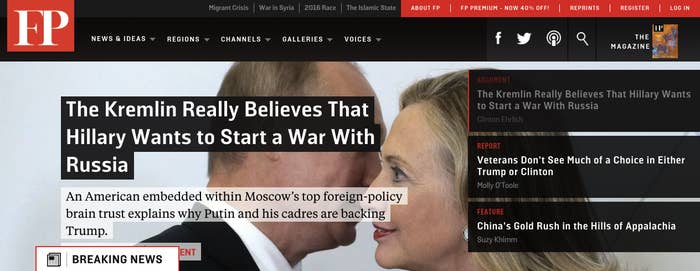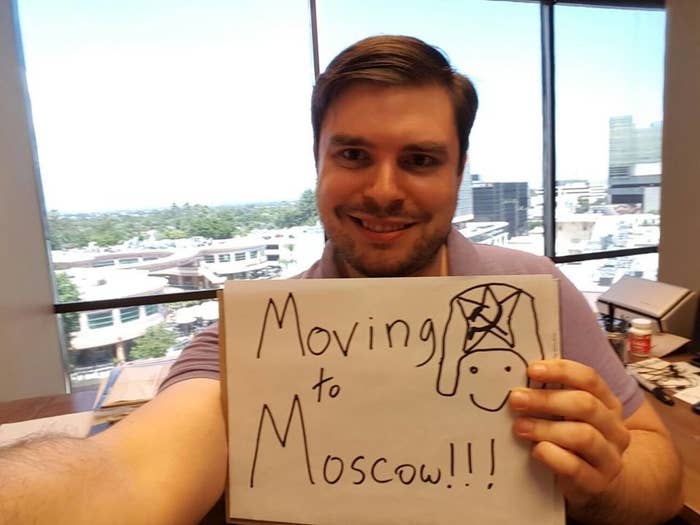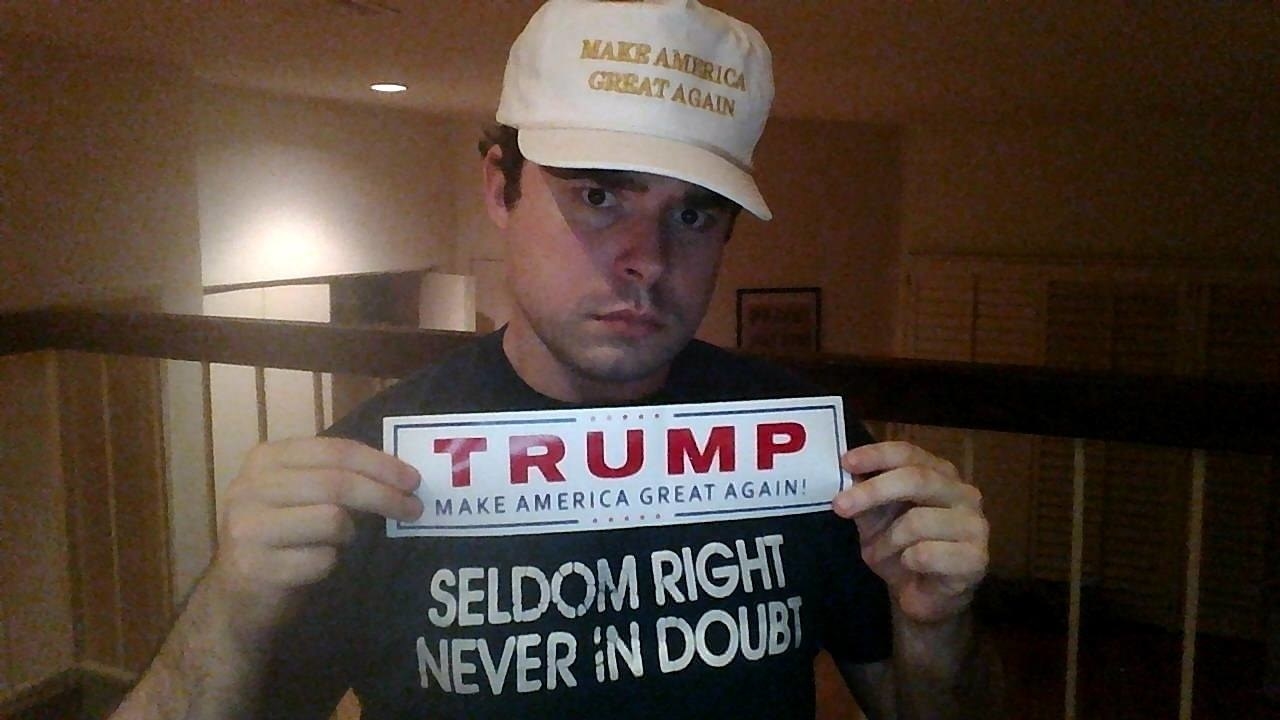
Foreign Policy is defending running an article on its website Wednesday that lays out what Moscow supposedly thinks of Hillary Clinton as being clearly an opinion piece, despite its numerous unsourced claims about Clinton’s worldview and her health.
The article, written by an American living in Moscow named Clinton Ehrlich, argues that many within Russia’s government see Clinton as unbalanced and dangerous, willing to start a new Cold War, and someone with a drinking problem. It repeats certain Kremlin talking points, including that the revolution in Ukraine was carried out by neo-Nazis, that George Soros seeks regime change in Russia, and that Clinton is “unstable.” The article, titled “The Kremlin really believes Hillary Clinton will start a war with Russia,” is Ehrlich’s first piece for the magazine’s website.
Ben Pauker, executive editor of Foreign Policy, defended the piece in an email to BuzzFeed News: “Clinton Ehrlich’s piece is labeled as an ‘argument’ and we’ve gone to extra efforts to make clear that it’s written by an American researcher working within Moscow’s top state-run, foreign-policy think tank. As such, he has a unique perspective on how the Russian elite view Hillary Clinton and Donald Trump. Foreign Policy strives to offer a range of views, and I think our readers are smart enough to make their own judgments as to the validity of his argument.”
US officials have grown increasingly concerned that Russia is attempting to destabilize the US election process, including through both direct methods, like their suspected involvement with the hackers who cracked the Democratic National Committee’s emails that were subsequently leaked, and indirectly through spreading misinformation and propaganda.
Ehrlich, 26, spoke to BuzzFeed News by Skype and Facebook Messenger from Moscow to say he was not a tool of the Russian government. He said he was doing a year of study at the Moscow State Institute of International Relations (MGIMO), a prestigious school that is the training ground for Russia’s diplomatic corps and is under the foreign ministry’s control. He claims to be the only Westerner there, and told BuzzFeed News he did not get permission from the foreign ministry to publish the story.
The story was picked up in Russia, including by state-run news agency RIA-Novosti.

Ehrlich described an unusual path, laced with descriptions of grandeur, that brought him to Moscow. The son of one of California’s top lawyers, he dropped out of high school and did not go to college. Instead, he says, he landed an internship at the age of 16 at the Claremont Institute working on a project on missile defense.
"You could say I was one person away from the President of the United States," he said of his time at Claremont, as he briefed a person who would infrequently brief the president. It was after that he began learning Russian, he says, having become interested in the place and culture through the course of his work on missile defense. He also says that during the following years he shed the “neocon propaganda I'd been consuming and excreting.”
Through the years he’s been to Moscow several times, he says, but it’s all been self-funded and more in the pursuit of the women he’d come in contact with while attempting to practice his Russian. “I have multiple exes who are Russian and I came to Moscow in March [2015] to visit a girl. A lot of what you see on my Facebook is related to my search for a soulmate, not anything policy related,” he said by Facebook Messenger.

Ehrlich also lists himself as the founder of several companies on LinkedIn, including the Willpower Supplements Corporation, which claims to be a distributor of the “world’s first willpower pill.” (Ehrlich noted that the product was sold out and “due to regulatory issues” likely would never be back in stock.)
Working under his father, he says, he had a key role in a much publicized case of an Iraq war veteran who was wrongfully convicted of murder being freed. That case, Ehrlich says, is what most likely tipped the scales for his admission to MGIMO. He’d applied to the institute last June, he said, and has paid his own way for his one-year at the school and for his own room and board.
When it comes to the US election, he supports Donald Trump, appearing in a “Make America Great Again” hat on his Facebook page. “It started as ironic,” he said on Facebook Messenger. “Then it became real, once he impressed me by supporting realist foreign-policy positions that I never imagined a candidate for President would actually have the intelligence or brass balls to back.”

Ehrlich denies that he was prompted to write the piece by foreign ministry officials, listing several ways where he disagrees with the Russian government. “One argument in defense of Crimea is idea of self-determination, and I think both Moscow and Washington are hypocritical,” he said, pointing to Russia’s brutal quelling of Chechen independence and the US refusing to let the South secede during the Civil War.
So why, then, did he feel the need to write his article about Clinton?
Ehrlich’s original pitch had nothing to do with Clinton — he sent an unsolicited email late last month, suggesting an anodyne article on why deterrence principles that worked during the Cold War wouldn’t make sense for cyberwarfare. Tucked into that pitch was the idea that Moscow elites see an existential threat in the outcome of the US election. That small aside would develop into the article published on the website this week.
“I felt a moral obligation to point out that a presidential candidate was calling Putin a Neo-Nazi,” Ehrlich said, referring to Clinton’s speech on the so-called alt-right, where she called Putin the “godfather” of Trump’s style of extreme nationalism. “I don't think it seems right to antagonize the country that has more influence than any other nation-state in the world.”
"I think part of the problem is this idea of propaganda,” he said. “If I were Russian and I was taking positions that lined up with official positions of the US that would be propaganda in Russia. If I express my sincere convictions and that lines up with things Moscow believes, I'm a propagandist.”
"I'm not hiding the fact that I like Russia," he said. "I feel like my views about international relations are something I can say here, because I agree with a lot of what the foreign ministry has to say and I value the culture and the people. What is this exterior motive I'm accused of having?"
